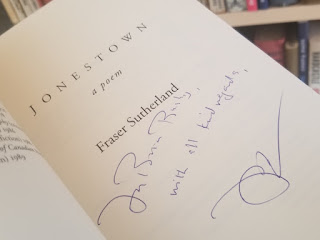Arthur Stringer
Tooloona: A Novel of the North
Now, given Stendal's thing for Celina, one might think that he'd let matters lie and report the bigamy upon his return to New York. If so, one would be mistaken. Instead, Stendal does all he can to break up the couple, going so far as to bribe Ootah, the local shaman, into telling Tooloona that she must leave Winslow.
Stendal's motivation isn't spelled out until quite late in the novel, though I imagine more thoughtful readers than myself might spot it early on. From the start, Stendal sees Tooloona as primitive, a savage, an animal. Even after she saves his life, he compares her to a "faithful dog." Yet, inwardly, he struggles with his growing physical attraction to Winslow's new mate:
He failed to remember the day or the occasion when he first grudgingly admitted that her body was a beautiful one, that there was something arresting in even the triangulated face with dark tangle of lashes along the smooth cheek, too pale to be called a daffodil-yellow and too dark to be compared to a gardenia. But he had not been compelled to revise his earlier estimate of her. Nothing was gained, he knew by contending that she was an undersized and flat-faced barbarian who exuded the odor of fish oil. It was the white man's duty to be loyal to his white race.
"I'll concede that she has her own ars erotica. That's imposed upon her, I suppose, by her environment. She has to be warmer-blooded, in a country like this, just as she has to wear warmer clothing. You can write it down to Nature's plan for keeping the race going. Where the soil is thin there must be no mistake about planting the seed. I'm not a medical man enough to know how true it is that the Innuit vulva is more prominent and prehensile than the white woman's."
Or does it?
The Inuit are seen through the eyes of Stendal, Winslow, and Celina (yes, she eventually shows up). Stendal is a white supremacist. Winslow appreciates Inuit culture, but only when it doesn't cross his own beliefs. Interestingly, it's late-to-arrive Celina who has the greater recognition and appreciation of the Inuit – Tooloona above all. Though Winslow likes to think that he understands the Inuit of Iviut Inlet, his fragile ego leads to tragedy.
It wasn't the character I wanted dead.
* Stringer's 1927 novel The White Hands, in which a pair of Jazz Age sisters are sent off North Ontario, provides a bit of a twist on the premise.
** I can't help but note that in Helen Dickson Reynolds' truly strange He Will Return (1959), abandoned wife Constance Owen-Jones discovers her husband is still alive through a newsreel street shot.
Trash – and not "good trash" – but none the less will appeal to the vast majority of those who demand nothing but "escape" from their reading. The story of a New Yorker who escapes civilization by joining a tribe of Eskimos in the Far North, "buying" a mate, and evading the claims of wife and home; succeeds in making so-called civilized ideals sufficient excuse for immorality.– Kirkus, 15 June 1936
Oh, I don't know. Might it have something to do with being more attracted to women than interior decoration?
Odd that Harlequin describes Tooloona as a "dark savage." Stringer doesn't.
Access: The Wife Traders was first published in 1936 by Bobbs-Merrill and McClelland and Stewart. Tooloona followed later that same year. And then, of course, we have the 1955 Harlequin paperback.
Used copies of The Wife Traders begin at US$6.50 (the Harlequin paperback in "Good-Very Good" condition). As of this writing, only two are listed online. Get them while you can! The Bobbs-Merrill appears more common. Asking prices range between US$17.00 and US$85.00. Copies with dust jackets begin at US$30.00.
No copies of Tooloona are listed for sale online.
Library and Archives Canada, the Toronto Public Library, the London Public Library, Memorial University, the University of New Brunswick, Mount Alison University, Acadia University, Dalhousie University, the University of Toronto, McMaster University, Guelph University, the University of Saskatchewan, the University of Alberta, Simon Fraser University, the University of British Columbia, and the University of Victoria hold one edition or other of The Wife Traders.
No Canadian library has a copy of Tooloona.
Note: I was inspired to read The Wife Traders by the 1936 Club week.






























